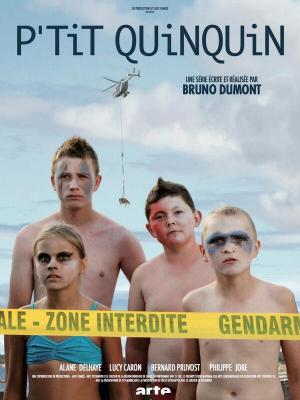Bruno Dumont won the Cannes Grand Prix twice – for dramas Flanders and Humanité – so of course his next film would be a 197-minute absurdist comedy about a Gallic Dennis The Menace and a series of brutal murders in a small French coastal town.
Li’l Quinquin is the kind of kid who fires off firecrackers in the house, but also has a sweet tween romance with a neighbor girl, Eve, whose parents don’t approve. They live in a sleepy little town near a couple of bunkers from the famed Maginot Line – a series of concrete bunkers that were supposed to protect France from invasion after the horrors of World War I (but failed completely) and are now mostly a playground for Quinquin, his pals and Eve.
When a cow is found dead in a bunker – in a place she should not have been able to access – with a human body inside her, it signals the beginning of a string of murders all equally brutal – investigated by a County Sheriff whose eyes continually bug out and blink while his head bobs like a chicken or turkey. His partner is a taciturn fellow called Carpentier – who seems to be a much better cop (if only his boss would pay attention).
Roger Ebert famously noted that ‘no good movie is long enough, but no bad movie can be too short.’ Even at 197 minutes, Li’l Quinquin seemed to fly by – despite its moderate pacing. Intriguing characters – Quinquin and his friends are typical tweens: full of contradictions. They can be cruelly racist or sexist one minute and sweetly romantic the next – they cheer Eve’s sister, Aurélie in a singing competition one night and mock her with a creepy version of her winning song the next.
There are a host of characters who fill out the cast – Quinquin’s parents and grandparents (while he will play pranks on his parents, he is totally respectful and solicitous of his grandparents); his uncle Dany, who moves like he either has had a brain injury, or some sort of muscle-ravaging disease; Mr. & Mrs. Lableu, a couple of neighbors – it’s the murder of Mrs. Lableu that first gets the attention of the police.
There are also a few new folks in town – black Muslims, who are subjected to casual racist treatment with poignant/horrifying results. The second murder victim is the head of a family that has not yet undergone its full tragedy.
Dumont, who wrote and directed Li’l Quinquin, has an interesting sense of humor – it ranges from playful to perverse to downright dark. Filmed in a very natural style, he uses the incredibly natural performances of his young actors to highlight the absurdity of other characters – and of the situations that arrive throughout.
He’s developed a sense of the absurd that rivals Twin Peaks – though without heightening his palette. That makes the movie’s absurdities even more pronounced. In fact, while the events of the movie might not be natural, the cinematography is quite impressively so. Dumont’s generous use of physical gags manage to straddle a line between slapstick and obnoxious and, while I’m not sure every last bit of humor was effectively translated (there was a French couple in the audience who laughed at a few things that we Anglos missed), by and large, it was spot on.
Li’l Quinquin may be the funniest film I’ve ever seen about existential despair versus unfounded optimism. This is a film that should generate an American deal. Any place that can enjoy Twin Peaks and Blue Velvet can certainly get behind Li’l Quinquin.
Final Grade: A

